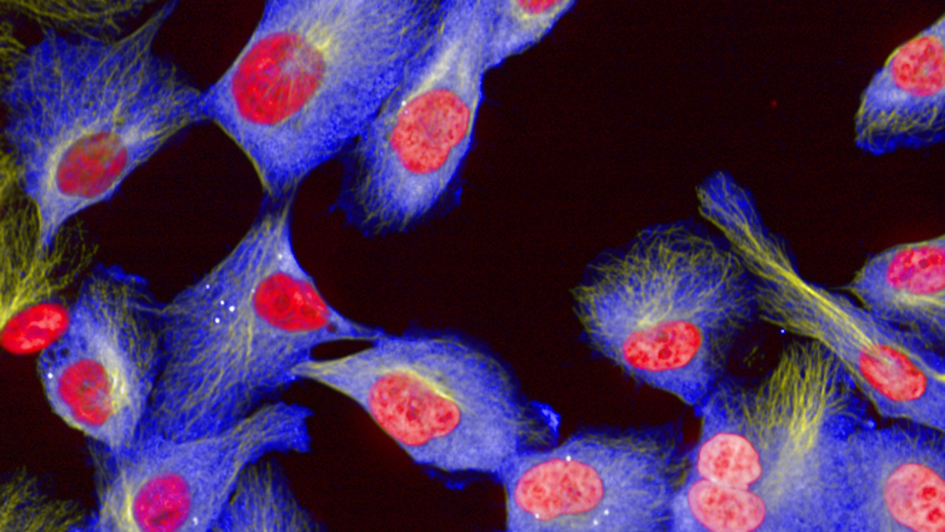
Image: Human mammary cells treated with Torib. Credit: Dr Chris Bakal, ICR 2014
Blood test could indicate palbociclib’s effectiveness
On St David’s Day we published news about a blood test that could quickly predict if the targeted drug palbociclib will help breast cancer patients.
Scientists revealed the test could detect in two to three weeks whether palbociclib is working, although they cautioned the results need replicating before they are used clinically.
Professor Nicholas Turner, Professor of Molecular Oncology at the ICR and Consultant Medical Oncologist at The Royal Marsden NHS Foundation Trust, said:
“Our new study found that a blood test for cancer DNA in the first two weeks of treatment indicated whether the drug was likely to be effective.
“Having an early indication of how likely a treatment is to work might allow us to adapt treatment – switching some patients to an alternative drug that is more likely to benefit them.”
Read the story in full
Pioneering genetic technique to analyse DNA
Scientists linked 110 genes to an increased risk of breast cancer, towards the end of March, in the most comprehensive study ever to unpick the genetics of the disease.
The research used a pioneering genetic technique to analyse maps of DNA regions linked to an inherited risk of breast cancer and identify the actual genes involved in raising a woman’s risk.
Dr Olivia Fletcher, Team Leader in Functional Genetic Epidemiology at the ICR, said:
“Identifying these new genes will help us to understand in much greater detail the genetics of breast cancer risk. Ultimately, our study could pave the way for new genetic tests to predict a woman’s risk, or new types of targeted treatment.”
Read the story in full
New breakthrough in breast cancer research
In April we covered exciting news that the lung cancer drug crizotinib could offer a new targeted therapy for thousands of breast cancer patients following the discovery that it can kill breast cancer cells with a particular genetic defect.
Lead author Professor Chris Lord, Professor of Cancer Genomics in the Breast Cancer Now Toby Robins Research Centre at the ICR, said:
“These are hugely promising laboratory findings and we’re very keen to learn whether this class of drug really works as a treatment for women with breast cancer.
“What we have seen so far suggests this is certainly an approach worth pursuing and we are very enthusiastic about the prospect of applying our scientific results in clinical trials.”
Read the story in full
A great example of personalised genetics
Our last story in April brought the news that targeting chemotherapy with genetic testing provides effective treatment for women with aggressive breast cancer.
Researchers co-led by Professor Andrew Tutt, Director of the Breast Cancer Now Toby Robins Research Centre at the ICR, found that women with advanced ‘triple-negative’ breast cancer who had inherited a BRCA mutation were twice as likely to benefit from chemotherapy drug carobplatin as docetaxel, which is currently standard of care for these patients.
Professor Judith Bliss, Director of the Clinical Trials and Statistics Unit at The Institute of Cancer Research, London, who led the management of the study, said:
“Our study has shown that this doesn’t have to mean developing new drugs. We can use existing – and often cheaper, generic – drugs more effectively by targeting treatment based on weaknesses in individual patients’ tumours.”
Read the story in full
Personalised treatment for women with breast cancer
We shared news in May that scientists had identified the cause of resistance to breakthrough breast and ovarian cancer drug olaparib, the development of which was underpinned by our research.
The research could help predict which patients will develop resistance to PARP inhibitors, like olaparib, and allow doctors to alter treatment at the earliest possible opportunity.
Study author Dr Stephen Pettitt, Staff Scientist in Cancer Genomics in the Breast Cancer Now Research Centre at the ICR, said:
“PARP inhibitors are hugely exciting new drugs which are especially effective in women with BRCA mutations – but unfortunately as with many other treatments it is common for cancer cells to eventually develop resistance.
“Testing for the mutations we have identified could offer even more personalised treatment for women with breast and ovarian cancer, by allowing doctors to judge whether and for how long olaparib should be used.”
Read the story in full
Supporting our breast cancer research
Research at the ICR is underpinned by generous contributions from our supporters.
You can help transform breast cancer research by supporting our programme of research into hormone receptor-positive breast cancer.
Find out more
comments powered by